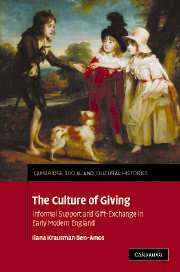Book contents
- Frontmatter
- Contents
- List of illustrations
- List of tables
- Acknowledgements
- List of abbreviations
- Introduction
- Part I Social spaces and reciprocities
- 1 Parents and offspring
- 2 Networks of support
- 3 Parishes, guilds and associations
- 4 The charitable gift
- Part II The economy of giving
- Part III The state, markets and gifts
- Conclusion
- Bibliography
- Index
2 - Networks of support
Published online by Cambridge University Press: 04 May 2010
- Frontmatter
- Contents
- List of illustrations
- List of tables
- Acknowledgements
- List of abbreviations
- Introduction
- Part I Social spaces and reciprocities
- 1 Parents and offspring
- 2 Networks of support
- 3 Parishes, guilds and associations
- 4 The charitable gift
- Part II The economy of giving
- Part III The state, markets and gifts
- Conclusion
- Bibliography
- Index
Summary
Informal support was bound to involve reliance on relations other than parents and their offspring. In a society in which about a fifth of the population became orphaned between their childhood and early adult life, and in which many parents did not live to see their children come of age, reliance on and the mobilization of wider networks of kin as well as other ties were likely to recur in the lives of individuals. Some of the hardship that attended the collapse of familial support could be alleviated through the formal relief system established by the poor laws (1601), but the process of implementing parochial relief in the course of the seventeenth century was piecemeal, and by 1700 it still affected only the more extreme situations of deprivation within a selected minority among the working population. For the vast majority of the population, who were facing the vagaries and precariousness of life in a society that had few institutional means to provide a modicum of security against many hazards, reliance on personal ties of support would have been almost inescapable.
How and to what extent were social networks mobilized? It has long been presumed that social ties in the pre-modern past formed a hierarchy of obligations, based on a core of co-resident and local lineage, and followed by concentric circles that spanned beyond the locality; the farther the co-resident kin, the weaker became the obligation and inclination to offer support.
- Type
- Chapter
- Information
- The Culture of GivingInformal Support and Gift-Exchange in Early Modern England, pp. 45 - 81Publisher: Cambridge University PressPrint publication year: 2008

